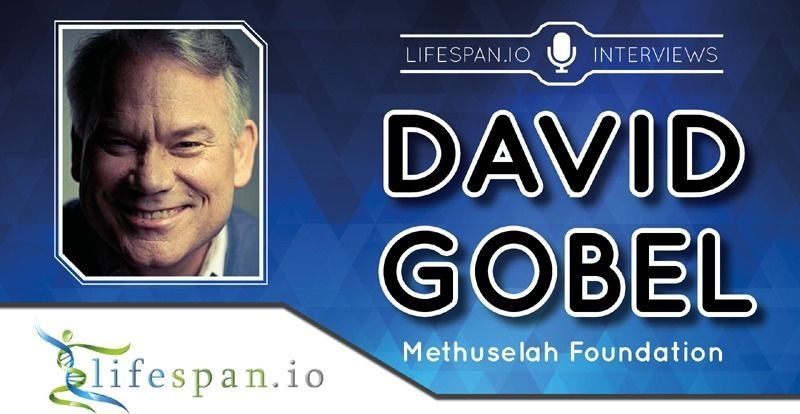To complete our international analog astronaut corps we are seeking for six volunteers between 25 and 45 years.
🖋️ http://classof2019.oewf.org
#classof2019 #WednesdayMotivation



An interview with Methuselah Foundation’s founder David Gobel.
David Gobel is an inventor, philanthropist, futurist, and passionate rejuvenation advocate and supporter; he’s known for co-founding Methuselah Foundation with Dr. Aubrey de Grey and for proposing the intriguing concept of “longevity escape velocity”, but his achievements and successes extend far beyond that. David has kindly granted LEAF a most interesting and detailed interview.
If you’re not familiar with the Methuselah Foundation, it is possibly the oldest organization active in the field of rejuvenation advocacy and support; it also works as an incubator for startups working in rejuvenation research and has helped kickstart many of the projects we talk so much about on our website. If you like, you can find more information on Methuselah Foundation in our older article.
We hope you enjoy Dave’s replies as much as we did!

More than a quarter (1.4 billion) of the world’s adult population were insufficiently active in 2016, putting them at greater risk of cardiovascular disease, type 2 diabetes, dementia, and some cancers, according to the first study to estimate global physical activity trends over time. The study was undertaken by researchers from the World Health Organization (WHO) and published in The Lancet Global Health journal.
Together, these estimates demonstrate that there has been little progress in improving physical activity levels between 2001 and 2016. The data show that if current trends continue, the 2025 global activity target of a 10% relative reduction in insufficient physical activity will not be met.
“Unlike other major global health risks, levels of insufficient physical activity are not falling worldwide, on average, and over a quarter of all adults are not reaching the recommended levels of physical activity for good health,” warns the study’s lead author, Dr. Regina Guthold of the WHO, Switzerland.

New research confronts the elephant in the room—the ‘trilemma’ of population growth, economic growth and environmental sustainability—and reveals the vast incompatibility of current models of economic development with environmental sustainability.
Using data collected from across the globe, national economies and natural resource use were closely examined by an international team of scientists using a mathematical model.
The results suggest that as long as our economic system retains its current structure, and if population growth continues, both high- and low-income countries will fail to achieve environmental sustainability.

Science is advancing rapidly, and the field of aging research is no exception. Our understanding of aging has grown a great deal in the last decade, and we are now reaching the point at which the first therapies that target aging are starting to arrive. Unlike the snake oil of previous years, some of these might actually work; today, we are going to have a look at NAD+ repletion, one such promising therapy.
In the near term, nicotinamide adenine dinucleotide (NAD+) is showing potential for addressing some of the aging processes. NAD+ levels decline significantly during aging in both humans and animals, and studies on old mice have shown that restoring NAD+ levels causes them to look and act like younger mice while increasing their lifespan.

Principles of game theory offer new ways of understanding genetic behavior, a pair of researchers has concluded in a new analysis appearing in the Journal of the Royal Society Interface. Its work opens the possibility of comprehending biological processes, and specifically biochemistry, through a new scientific lens.
The exploration considers signaling game theory, which involves sender and receiver interactions with both seeking payoffs.
“The view of genes as players in a signaling game effectively animates genes and bestows simple utilities and strategies—thus, unique personalities—on them,” explains Bhubaneswar “Bud” Mishra, a professor at NYU’s Courant Institute of Mathematical Sciences, who co-authored the analysis with Steven Massey, an associate professor at the University of Puerto Rico. “In this view, the genome possesses characteristics of a molecular society, complete with deception, imitation, cooperation, and competition—not unlike human society. This adds a grandeur to a traditional view of life and the interactions it is made up of.”


As technology advances, prospects for increasing the human life span are seemingly everywhere.
But is there a limit to how long humans can live? According to a new study, published today (June 28) in the journal Science, the answer to that question is no. What’s more, the researchers argue that after age 105, the risk of dying each year remains the same.
In 1825, British actuary Benjamin Gompertz proposed that the risk of dying exponentially increases by age, such that a person at age 70 would be at a much higher risk of dying than a 30-year-old. [Extending Life: 7 Ways to Live Past 100].

In my life as a human, I see clues that evolution on Earth and elsewhere in the cosmos at large is not being pushed from behind in entropic randomness but being pulled forward by complexification, natural selection and other evolutionary forces orchestrated by a strange unseen teleological attractor, in McKenna’s words “the Transcendental Object” at the end of time. One may see significant overlapping ideas between the transhumanist Technological Singularity and the Teilhardian Omega Point. The coming Technological Singularity could unravel one of the deepest mysteries of fractal hyperreality: consciousness alternating from pluralities to singularities and from singularities back to pluralities. We are already immortal, but the forthcoming Syntellect Emergence when your mind is digitized, will preserve some of your organic memories if you so desire, and most importantly, will ensure the continuity of your subjectivity into the higher realms of existence. #LifeboatFoundation
By Alex Vikoulov.
“If the doors of perception were cleansed then everything would appear to man as it is, Infinite. For man has closed himself up, till he sees all things through narrow chinks of his cavern” –William Blake.